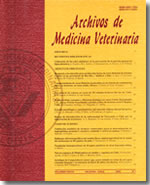Porcine recombinant somatotropin administered to piglets during the first week of life: effects on metabolic and somatometric variables
Main Article Content
Abstract
The aim of this study was to evaluate the effect of porcine recombinant somatotropin (rpST) administered to piglets during their first week of life, on metabolic and somatometric variables. A total of 220 piglets born from 40 hybrid Landrace x Large White sows were used. Piglets were randomly assigned to either Group 1 (G1, Control, n = 106) or Group 2 (G2, rpST treatment, n = 114). The rpST dose was 1mg/kg every 24h during 7 consecutive days. Serum pH at birth showed significant differences between groups (7.42 ± 0.47 and 7.31 ± 0.59), although this difference dissapeared on day 8. There was a significant increase (P < 0,001) in plasma glucose levels for the treated group on day 8 (68.78 ± 10.44 and 103.71 ± 18.44). Average daily weight gain was also higher for the somatotropin treated group compared to the control (137.25 ± 31.31 and 209.21 ± 45.97). Comparisons for interaction between treatment and sex showed dramatic differences (P < 0,001) for glucose, lactate and weight gain for the males from G2 when compared to the females from the same experimental group on day 7 post-treatment. Piglets treated with rpST showed significant differences in abdominal perimeter (28.67 ± 4.41 and 31.79 ± 3.74), dorsal length (28.42 ± 2.66 and 30.21 ± 4.70), and ham roundness (18.79 ± 2.62 and 22.38 ± 2.98). There is an ongoing research that will allow to determine the composition of body mass (bone or muscle) in the treated piglets.

